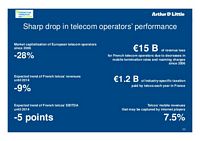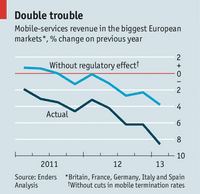The EU common or single market as the media most often refers to it is far from being actually implemented. Many economic sectors are still being over seeded (understand barricated from foreign entry) by national law. A good example is the telecommunications sector, where since many years, mobile consumers are those paying the price of national protectionist measures. While at first glance, one might believe this article to bear some ideological belief, let me assure you that nothing but my point of view as a concerned consumer and citizen leads the argument.
Trying to shake deeply rooted actors
For starters, let's review the situation. Back in 2006, the EU parliament recognizes that the inter-state telecomunications sector is rather difficult to access and uncompetitive. In a push to stem competition and protect mobile phone users from unfair tarifs due to roaming practices, the Parliament decides to regulate with (CE) No 717/2007 .
The idea behind this directive was that a reduction in income from roaming charges was to push carriers to expand to other markets in order to cover for their losses. Nevertheless, under the pressures of telecom lobbies, the parliament decided to implement the directive in a gradual way (by lowering cap on tarifs by a little every year) with a total suppression supposedly taking place in January 2016.
How weak the EU's main institution is
Little did the Parliament expect, the EU Council recently added another layer of delays to the implementation of the measure (this time for 2018?). Not only did it override the Parliament's and the Commission's decision in the most disrespectful show of power way but also showcased how little transparency there in the law enacting procedures of the EU. Given the 2009-2014 recession, it is hard to believe that there is still will to maintain national barriers for inter-sectorial competition in Europe, especially for an area of life that is vital to the principle of free movement of people. Why is the situation in such a stalemate?
In an environment with more than 40 different carriers, a measure substracting a fair amount of income has a good chance of destabilizing the market. But, most importantly, it is also expected to bring consolidation through a series of M&A's and less hopefully bankruptcy for the smaller, less fortunate ones. In summary, good news for consumers and bad news for carriers... (cf. photo: Arthur D. Little © 2012)
Why deregulation did not lead to market correction
Continuous dependance on a single high source of income has rendered many carriers strategically ineffective and has led them to behave like non-innovative monopolies. This situation was allowed and even promoted by national regulators who instead of opening up their markets have increased barriers to entrance through "pay-to-access licences" and more...(cf. photo: The Economist © 2015).
In March 2015, the Parliament under the Juncker Commission tried once again to push for further market integration through a new framework. Although, their intentions are to be praised, it is difficult to foresee how will conservative forces (lobbies and state legislatures) react to the move of the new Commission and the Parliament.
2018 Stalemate: waiting or acting ?
To end up with good news, it is worth noticing that two carriers have actually decided to move on their own and start preparing for a roaming free world. Orange (France) and Vodafone (UK) have started integrating their Western and Eastern European subsidiaires in a strategic move to turn this legislative threat into a market opportunity. By removing fees prior to the due date, they will attract that growing segment of very mobile customers that are the most affected by those fees.



